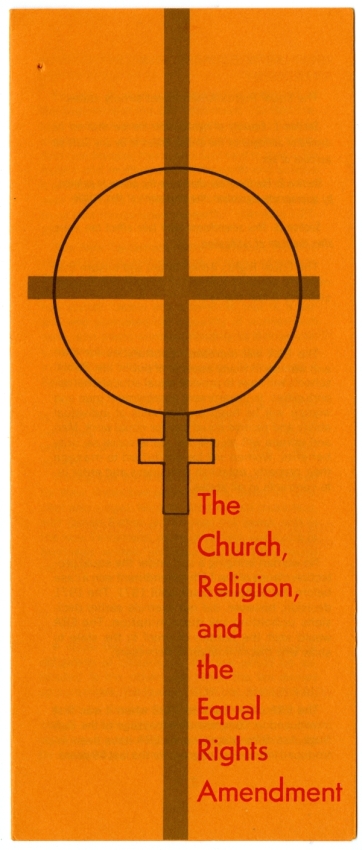Florida Memory is administered by the Florida Department of State, Division of Library and Information Services, Bureau of Archives and Records Management. The digitized records on Florida Memory come from the collections of the State Archives of Florida and the special collections of the State Library of Florida.

State Archives of Florida
- ArchivesFlorida.com
- State Archives Online Catalog
- ArchivesFlorida.com
- ArchivesFlorida.com
State Library of Florida
Related Sites

Description of previous item
Description of next item

Source
Description
Date
Creator
Format
Topic
Subjects
General Note
Laws which apply to only one sex because of reproductive differences, i.e. maternity benefits, would not be affected.
Equality will not mean that men and women will be regarded as identical. The right to privacy under the Constitution would permit a separation of sexes under some circumstances, i.e. restrooms and sleeping quarters in public institutions.
HOW WILL THE ERA AFFECT THE FAMILY?
The ERA is unlikely to have a direct impact on women in their roles as wife and mother. ERA will only eliminate legal discrimination and not interfere with social customs or personal relationships.
Dr. Marjorie East, president, American home Economics Association, believes the ERA will have a positive affect on the family and male-female relationships.: "Our members working in support of the ratification of the Equal Rights Amendment in the states have reported the frequent accusation that the Equal Rights Amendment would undermine the family. We do not believe this to be the case.
"We believe the ratification and implementation of the amendment will serve to remove inequalities in attitude, as well as in law, which have penalized both men and women. Often overlooked are the ways in which men would benefit from the changes which the amendment would set in motion. The end result would be real progress toward true human rights, and thus human dignity for both sexes."
AFTER ERA RATIFICATION, WOULD WOMEN BE DRAFTED?
Congress has always had the power to include women in the draft. The participation by women in military service will depend on the status of the draft after ratification. If a volunteer army exists, women would be eligible on the same basis as men; educational requirements, assignments, and promotion will be the same for qualified men and women. If a draft exists, women would be subject to the draft, provided the same alternatives to service, exemptions from service and assigned on the basis of their capabilities.
HOW WOULD THE ERA AFFECT OTHER LAWS?
Protective Labor Laws. Laws which actually do provide optimal working conditions would be extended to men and women. Restrictive laws limiting hours of work, night work, employment in particular conditions or occupations and weight-lifting would be invalidated. Employment would be based on a person's capacity to perform a job.
Domestic Relations Laws. Alimony would be awared to either spouse on the basis of needl; child support obligations would be based on the means of each spouse; custody of the children would be given to the parent most able to provide for the children's welfare.
Criminal Laws. State laws prescribing longer prison sentences for women than for men for the same crime would be invalidated. BUt the ERA will not invalidate laws punishing rape.
DOES THE ERA INFRINGE ON STATES RIGHTS?
When the constitution is amended, states retain the right to enforce the amendment as it effects state laws. After ratification of the ERA, states will have to years to bring their laws into compliance. Washington state proved this is possible. The state ratified the constitutional amendment, passed a state ERA, and within one year brough all laws into compliance.
The Equal Rights Amendment will assure the legal rights of women. Not to guarantee these rights is to deny the full humanity of women and to deny the basic meaning fo the Constitution of the United States which recognizes human dignity and equality. Rights cannot be given, they already exist, but they must be recongized and supported by our action. Passage and the Equal Rights Amendment... is one of the most important actions our nation can take to affirm the principles on which this nation was founded, pricniples which flowed out of our religious heritage.
-Claire Randall, General Secretary, National Council on Churches
This leaflet was prepared and is being distributed by the ERA Support Project, a joing project of the Women's Division of the Board of Global Ministires and the Board of Church and Society of the United Methodist Church. For further information write: ERA Support Project, 100 Maryland Ave., N.E., Washington, D.C. 2002.
Additional copies of this leaflet available from Service Department, 100 Maryland Ave., N.E., Washington, D.C. 20002. Order No. W6000. Contributions to cover printing and mailing costs are welcome.
Project Equality participant
Title
Subject
Description
Creator
Source
Date
Contributor
Format
Language
Type
Identifier
Coverage
Thumbnail
Display Date
ImageID
topic
Subject - Corporate
Subject - Person
Transcript
WHAT IS THE EQUAL RIGHTS AMENDMENT?
The Equal Rights Amendment simply states:
Section 1. Equality of rights under the law shall not be denied or abridged by the United States or by any State on account of sex.
Section 2. The Congress shall have the power to enforce, by appropriate legislation, the previsions of this article.
Section 3. This amendment shall take effect two years after the date of ratification.
The Equal Rights Amendment will ensure that men and women have the same rights and responsibilities under the law.
WHY IS THE ERA NEEDED?
The ERA will increase opportunities for men and women in many aspects of public life. Public schools will have to provide equal educational opportunities. In government employment men and women will be hired on the of individual ability and receive equal pay for equal work. Men and women will receive the same social security benefits. Women will be permitted to manage their property, establish a business and enter into contracts in all states.
DOESN'T THE CONSTITUTION ALREADY GUARANTEE EQUAL RIGHTS?
No woman brining a suit under the equal protection clause of the 14th Amendment won a case before the Supreme Court until 1971. The 1971 decision, however, did not overrule earlier decisions upholding sex discrimination. The ERA would shift the burden of proof to the state to show why discrimination is necessary.
WHAT IS THE HISTORY OF THE ERA?
The ERA dates back to 1923 when it was first introduced in Congress after passage of the Suffrage Act. Bills proposing an ERA have been introduced into every Congress for the last 49 years.
HOW WILL THE ERA BECOME LAW?
Congress pass the ERA in 1972. Now three-fourths of the state legislatures (38) must ratify the ERA by March 1979 before it becomes the 27th Amendment.
WHO SUPPORTS THE EQUAL RIGHTS AMENDMENT?
Presidents Eisenhower, Kennedy, Johnson and Nixon have supported the Amendment.
The list of secular and religious organizations supporting the ERA continues to grow. Among those who support the Amendment are: AFL-CIO, American Nurses Association, Business and Professional Women, League of Women Voters, National Association for the Advancement of Colored People, National Organization for Women, YMCA.
Nineteen religious groups signed the Joint Religious Statement on Equal Rights: American Baptist Convention, Division of Christian Social Concern; American Baptist Women, Board of Managers; American Ethical Union; American Humanist Association; Board of Directors. Lutheran Church Women; Church of the Brethren' Church Women United; Christian Women's Fellowship, Disciples of Christ; Friends of Committee on National Legislation; National Council of Churches; Presbyterian Church in the U.S., Office of Church and Society; Task Force on Women, United Presbyterian Church; Unitarian Universalist Association; Unitarian Universalist Women's Federation; United Methodist Board of Church and Society; United Church of Christ, Council for Christian Social Action; United Presbyterian Church in the U.S.A., Washington Office; United Presbyterian Women, National Executive Committee; Women's Division, Board of Global Ministries, United Methodist Church.
WHAT ARE DENOMINATIONS SAYING ABOUT THE ERA?
The 1972 General Conference of the United Methodist Church:
The Gospel makes clear that Jesus regarded women, men, and children equally. In contrast to the contemporary male centered society, Jesus related to women with respect and sensitivity, as individual persons.
... We therefore commend the U.S. Congress for its passage of the Equal Rights Amendment to the U.S. Constitution and call upon the various states to ratify this Amendment in order to insure that 'equality of rights under the law shall not be denied or abridged by the United States or by any State on account of sex.'
We further urge all United Methodists to work through the appropriate structures and channels toward ratification of the Amendment by their respective states.
The 112th General Assembly of the Presbyterian Church in the United States affirms the following convictions:
God made both women and men equal in his sight; hence, any discrimination on the basis of sex which assumes an inherent inferior-superior relationship is contrary to the will of God... This 112th General Assembly... urges its members to work in society to promote the equal stats of women specifically... to call on their state legislatures, if those legislatures have not already done so, to ratify the Amendment... to provide specifically for equal rights for women.
The 1973 General Assembly of the Christian Church (Disciples of Christ):
While admitting that it has not always lived up to its own teachings, the church has long proclaimed that laws and practices which prevent women from exercising their freedom as children of God are morally indefensible.. THEREFORE, BE IT RESOLVED that the General Assembly... endorse the Equal Rights Amendment and urge its ratification by those states where that has not yet occurred...
The 1970 General Assembly of the Unitarian Universalist Association, the 1970 Annual Conference of the Church of the Brethren, and the 1970s General Assembly of the United Presbyterian Church USA have passes similar resolutions.
WHAT IS THE BASIS FOR RELIGIOUS SUPPORT OF ERA?
Equality of men and women is affirmed at the beginning of the Old Testament: "So God created man in his own image, in the image of God he created him; male and female he created them. And God blessed them, and God said to them, 'Be fruitful and multiply and fill the earth and subdue it and have dominion over the fish of the sea and over the birds of the air and over every living thing that moves upon the earth.'" (Genesis 1:27-28)
The New Testament Further develops the concept of equality and mutuality of men and women. Jesus repeatedly acknowledged women as humans beings in his relationships. One theologian has states: "Jesus was a feminist, that is, a person who promoted the equality of women with men, who treats women primarily as human persons and willingly contravenes social customs in so acting." (Leonard Swidler, "Jesus Was A Feminist")
The rejection by Jesus of prevailing customs is seen throughout the Gospels: women were permitted to study the scriptures, to use their intellectual skills, to speak in public and to bear witness.
Throughout the Bible women are remembered for this distinctive contributions: Deborah (prophet and judge), Miriam (prophet and musician), and Queen Esther (who saved the Jews); and in the New Testament, Anna (prophet), and Lydia (a business women who founded an early house church).
HOW WILL THE ERA AFFECT STATE AND FEDERAL LAWS?
When the law confers a benefit, privilege or obligation of citizenship, the law would be extended to the other sex. When the law denies opportunities, the law would be unconstitutional.
When the law applies to both sexes but makes an age distinction because of sex, i.e. the legal age for marriage, the age distinction would be removed.
Laws which apply to only one sex because of reproductive differences, i.e. maternity benefits, would not be affected.
Equality will not mean that men and women will be regarded as identical. The right to privacy under the Constitution would permit a separation of sexes under some circumstances, i.e. restrooms and sleeping quarters in public institutions.
HOW WILL THE ERA AFFECT THE FAMILY?
The ERA is unlikely to have a direct impact on women in their roles as wife and mother. ERA will only eliminate legal discrimination and not interfere with social customs or personal relationships.
Dr. Marjorie East, president, American home Economics Association, believes the ERA will have a positive affect on the family and male-female relationships.: "Our members working in support of the ratification of the Equal Rights Amendment in the states have reported the frequent accusation that the Equal Rights Amendment would undermine the family. We do not believe this to be the case.
"We believe the ratification and implementation of the amendment will serve to remove inequalities in attitude, as well as in law, which have penalized both men and women. Often overlooked are the ways in which men would benefit from the changes which the amendment would set in motion. The end result would be real progress toward true human rights, and thus human dignity for both sexes."
AFTER ERA RATIFICATION, WOULD WOMEN BE DRAFTED?
Congress has always had the power to include women in the draft. The participation by women in military service will depend on the status of the draft after ratification. If a volunteer army exists, women would be eligible on the same basis as men; educational requirements, assignments, and promotion will be the same for qualified men and women. If a draft exists, women would be subject to the draft, provided the same alternatives to service, exemptions from service and assigned on the basis of their capabilities.
HOW WOULD THE ERA AFFECT OTHER LAWS?
Protective Labor Laws. Laws which actually do provide optimal working conditions would be extended to men and women. Restrictive laws limiting hours of work, night work, employment in particular conditions or occupations and weight-lifting would be invalidated. Employment would be based on a person's capacity to perform a job.
Domestic Relations Laws. Alimony would be awared to either spouse on the basis of needl; child support obligations would be based on the means of each spouse; custody of the children would be given to the parent most able to provide for the children's welfare.
Criminal Laws. State laws prescribing longer prison sentences for women than for men for the same crime would be invalidated. BUt the ERA will not invalidate laws punishing rape.
DOES THE ERA INFRINGE ON STATES RIGHTS?
When the constitution is amended, states retain the right to enforce the amendment as it effects state laws. After ratification of the ERA, states will have to years to bring their laws into compliance. Washington state proved this is possible. The state ratified the constitutional amendment, passed a state ERA, and within one year brough all laws into compliance.
The Equal Rights Amendment will assure the legal rights of women. Not to guarantee these rights is to deny the full humanity of women and to deny the basic meaning fo the Constitution of the United States which recognizes human dignity and equality. Rights cannot be given, they already exist, but they must be recongized and supported by our action. Passage and the Equal Rights Amendment... is one of the most important actions our nation can take to affirm the principles on which this nation was founded, pricniples which flowed out of our religious heritage.
-Claire Randall, General Secretary, National Council on Churches
This leaflet was prepared and is being distributed by the ERA Support Project, a joing project of the Women's Division of the Board of Global Ministires and the Board of Church and Society of the United Methodist Church. For further information write: ERA Support Project, 100 Maryland Ave., N.E., Washington, D.C. 2002.
Additional copies of this leaflet available from Service Department, 100 Maryland Ave., N.E., Washington, D.C. 20002. Order No. W6000. Contributions to cover printing and mailing costs are welcome.
Project Equality participant
General Note
Chicago Manual of Style
ERA Support Project. The Church, Religion, and the Equal Rights Amendment. 1973 (circa). State Archives of Florida, Florida Memory. <https://www.floridamemory.com/items/show/325543>, accessed 23 January 2026.
MLA
ERA Support Project. The Church, Religion, and the Equal Rights Amendment. 1973 (circa). State Archives of Florida, Florida Memory. Accessed 23 Jan. 2026.<https://www.floridamemory.com/items/show/325543>
AP Style Photo Citation
(State Archives of Florida/ERA Support Project)

 Listen: The World Program
Listen: The World Program
